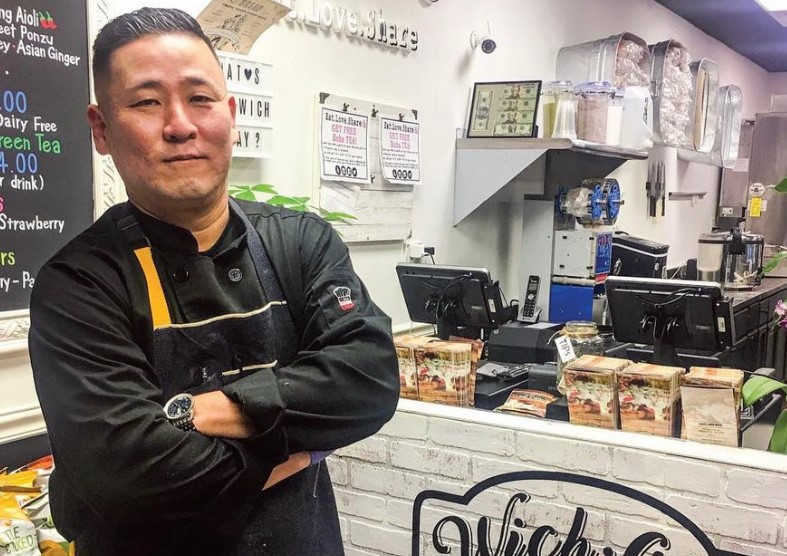COVID-Besieged NJ Businesses Find a New Appetite for Digital Behaviors

Marcello Chi remembers the day in March of 2020 when the U.S. went into lockdown. Not only was he terrified of a mysterious virus but also worried about losing his Korean-inspired restaurant in Cliffside Park.
“The first wave of the pandemic, the first couple of weeks it was bad but afterwards people got tired of eating at home and take-out orders started coming in a lot more,” Chi said.
Chi’s restaurant, Wich-One, survived, thanks to take-out orders and a forgivable Small Business Administration (SBA) COVID-19 Economic Injury Disaster Loan (EIDL). He used the money to pay off other loans he had taken out in order to navigate the early days of the pandemic. However, Chi says the money wasn’t enough to turn over a profit.
“I was taking out of my own pocket to pay the rent and payroll,” Chi added. “I literally had to get rid of people because I couldn’t afford to pay them, and although minimum wage is around 12 bucks, people were coming in for interviews wanting 15 dollars. They knew I was strapped, and they could make any demands they wanted.”
But the innovative restaurateur forged on, determined to keep his beloved restaurant open. Over time, though, Chi says he found himself paying out as much as 30 percent of his sales to delivery apps.
“I tried to get rid of the apps but people — if you’re not on them — they won’t order from you,” Chi pointed out. “I tried to get rid of them but sales dropped. Then, I said, ‘there’s no point in fighting them, just join them.’”
Despite that, Chi says every day felt like an uphill battle. So, at the beginning of May, Chi made the heartbreaking decision to shut down his restaurant. He took to Instagram to announce Wich-One would close after May 31st.
“Keep on following,” Chi wrote on Instagram, “Maybe something exciting will rise from the dust in the future.”
For Chi, the apps or the pandemic weren’t the final straw. The culprit, he says: prices going up on almost everything, from meat to take-out containers. The restaurant owner says he had no choice but to charge more for his food. Before the pandemic, food enthusiasts couldn’t get enough of his instagram-worthy sandwiches and bowls. But as they struggled financially themselves, many weren’t willing to pay the extra money.
“Orders went down a lot, and if I were to charge the original price, I would be giving food away,” Chi pointed out. “My ribeye went from $5.75 a pound to $9 a pound, and now it went down to $7. Supplies, everything, containers, little brown bags, everything went up.”
The Bureau of Labor Statistics reports that the Consumer Price Index (CPI), which is used to measure inflation, rose 0.8 percent in February, up 7.9 percent over the last twelve months. The rate is as high as it’s been in 40 years.
Chi doesn’t want any more government loans. It’s why he’s taken an offer to manage and be a partner in a Battery City deli. There won’t be a kitchen there for Chi to whip up his twist on a Philadelphia Cheesesteak or to prepare his take on a Bibimbap. But he’ll have peace-of-mind rent won’t be due next month. He believes that if he works hard he'll be able to pay off his loans and someday bring back some version of his restaurant.
Chi’s story isn’t unique. There are thousands of businesses across New Jersey and the nation on the brink of collapse.
[caption id="attachment_48813" align="alignleft" width="300"] Bracken[/caption]
Bracken[/caption]
“The bottom line for all of these businesses, they need money to help with all of these issues that are causing distress,” said Thomas Bracken, President and CEO of the New Jersey Chamber of Commerce.
The bottom-line, businesses, from gyms to restaurants, are struggling not because of mismanagement but because of a global pandemic that has killed almost one million people in the United States alone.
The SBA has offered businesses forgivable loans through its Paycheck Protection and EIDL programs. So far, the SBA has paid out almost $26 billion but $48 billion continues to sit in the fund pending the processing of received applications. Since restaurants in general operate at a very slim margin, waiting for funding could mean the difference between staying open or shutting down.
On Tuesday, U.S. Senate Committee on Small Business & Entrepreneurship Chair Ben Cardin and U.S. Senate Appropriations Subcommittee on Financial Services And General Government Chair Chris Van Hollen (both Democrats from Maryland), urged the SBA to process the pending applications.
“We are writing to express disappointment in the Small Business Administration’s (SBA) decision to close down the COVID EIDL program ahead of the May 6th deadline,” reads the letter from Van Hollen and Cardin to U.S. SBA Administrator Isabella Casillas Guzman. “By prematurely shutting down the program, the agency appears to have prioritized its own administrative needs over those of thousands of borrowers that await decisions on their applications.”
We were unable to get a comment from the SBA. On Tuesday, the SBA announced that Guzman had been diagnosed with COVID and was working from home while dealing with mild symptoms.
U.S. Representative Tom Malinowski spent Tuesday criss-crossing Union County, visiting small
[caption id="attachment_132922" align="alignright" width="300"] Malinowski[/caption]
Malinowski[/caption]
businesses. One of his stops, Westfield, where many storefronts remain vacant. Big clothing chains like Ann Taylor and Francesca’s closed their stores in town. Lord & Taylor shuttered its brick-and-mortar department store in Westfield, as well, after taking its iconic brand online. Some little mom and pop stores have also closed their doors. Malinowski is promising residents he’ll be fighting for them, especially as they face more problems because of the supply chain issues.
“New Jersey small businesses support most of the jobs in our state, so helping them overcome challenges like the COVID shutdowns and Tropical Storm Ida has been critical to our economy,” Malinowski said. “I’m going to keep working in Congress to ensure they receive the support they need to thrive.”
Democrat Congressman Malinowski also visited businesses in Phillipsburg, including MAC Pizza & Wings, where Malinowski says the owners told him they’re feeling the brunt of the inflation but that their employment has improved since COVID.
Democrat Governor Phil Murphy has also promised to help businesses.
“Governor Murphy believes that small businesses are the backbone of our state,” said Alyana Alfaro Post, the Governor’s press secretary. “Since the start of the COVID-19 (pandemic), the State has distributed over $850 million in funding to assist small businesses as our state continues to recover economically from the impacts of the pandemic.
[caption id="attachment_131992" align="alignleft" width="300"] Murphy[/caption]
Murphy[/caption]
“The Governor’s proposed FY 2023 budget includes $50 million in new funding for small businesses and supports many other programs that help businesses directly and indirectly. The Governor is open-minded to additional options to assist small business owners and workers.”
New Jersey Chamber of Commerce’s Bracken says the Murphy administration has taken measures to help businesses but that the $850 million that has been provided so far is simply not enough to meet the capital needs of the business community. He says the Governor can tap into the American Rescue Plan to provide emergency relief to businesses. The plan was passed in 2021 to provide help to the American people, including providing child tax credits for families and payroll assistance.
“The business community is the backbone of the economy and is the source of jobs that have to be created to help people,” Bracken said. “If you don’t have a healthy economy, you’ll have a weak economy to fund these programs (social programs). What we’re saying is if you help the business community, you’ll create jobs. You’ll create revenue to provide help for social programs.”
Bracken is also concerned that the Murphy Administration is asking the business community to replenish the state’s bankrupt Unemployment Trust Fund over the next three years.
“We are asking the American Rescue Plan to replenish the Unemployment Trust Fund so that the business community doesn’t have to pay the taxes,” Bracken added.
We’ve reached out to the Murphy Administration to find out how money from the American Rescue Plan can be used to help businesses. We were told to contact the Economic Development Authority for information about significant resources the state has put into place to help small businesses. We contacted the NJEDA but no one has gotten back to us.
[caption id="attachment_134998" align="alignleft" width="300"] Buning[/caption]
Buning[/caption]
In the meantime, National digital expert Jordan Buning, who leads ddm marketing + communications, says businesses, including restaurants, need to treat their brick-and-mortar and digital experiences as unique elements of the same customer service experience. He encourages business owners to promote their brands and services on their websites and social media platforms.
“The game is about getting in front of consumers, building a reputation, and cultivating relationships" Buning pointed out. “Restaurants will need to be proactive in reaching customers rather than expecting to be found.
“The new restaurant business models need multiple revenue streams. Restaurants need to rethink how to have those different kinds of service models and guest experiences out of a single restaurant, from online presence, handling orders to floor plans. Digital ordering is an example. Online-ordering platforms have watched demand for their services increase (by) ten-fold since the start of the pandemic. Even though there might be a dip since indoor dining came back, a good mix of all ordering in restaurants is still going to be off-premise customers.”
Buning says customers will continue to leverage digital behaviors they forged during the pandemic, and that businesses need to accept this new world. He says Chatbots, a computer program designed to interact with customers over the internet, can be an option for some businesses.
“Be digital first, even in-store,” he says. “Beyond a website and app, invest in customer facing digital tools that enhance the customer experience in-store and when they can’t be in-store. These platforms (allow) you to livestream events hosted by store associates and take orders in real time through website(s) or apps.”
For now, though, business owners like Chi are focusing on navigating the immediate rough waters the pandemic has pushed into their paths.
“At first I was sad,” Chi said. “At first it was like a dream gone but I have very strong faith that everything happens for a reason. I believe in God’s plan. Right now, I am relieved only because it takes a lot of the worries out of the day-to-day.





